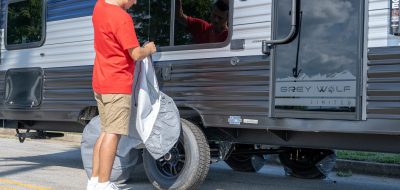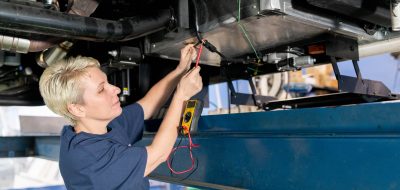By Ken Freund
 With gas prices still trending upward, energy costs are of great concern to RVers. Our recent article on fuel saving was so popular that we’ve added a few more timely suggestions.
With gas prices still trending upward, energy costs are of great concern to RVers. Our recent article on fuel saving was so popular that we’ve added a few more timely suggestions.
• Keep your engine properly tuned and perform all factory recommended vehicle maintenance, especially spark plugs, air- and fuel-filters.
• Avoid excess idling; you get zero mpg at idle. When waiting for several minutes or longer (such as a long, slow-moving train, or road construction stoppages, shut the engine off.
• When starting a cold engine, let it idle long enough to circulate the oil and for the engine to run smoothly. However, rather than letting it idle for a long period to warm up, drive it gently (at less than half throttle) until it reaches normal operating temperature.
• Drive more slowly. You’ll get substantially better fuel economy at 55 mph than at 65 or 70 (often as much as 20% improvement).
• On fairly level roads, use cruise control to maintain a steady pace.
• Look farther ahead and anticipate traffic lights and other slowdowns.
• Don’t use air conditioning when you can use vents. Also, the defrost position uses the air conditioning, too, so use it only as needed.
• Make sure you use the correct oil viscosity for the anticipated temperature range. Oil that is unnecessarily thick (higher SAE viscosity number) will reduce fuel mileage slightly.
• At least once a month, check tire pressures and make sure they’re at the manufacturer’s recommended pressure based on load-inflation tables.
• Measure tire pressures before starting out when they are cool, and visually check the tires just before you get back into your vehicle after a stop.
• Time your trip to avoid traveling during peak traffic times in urban areas.
• Weight is the enemy of fuel economy. Remove any unnecessary items from storage compartments and don’t carry any more water than you’ll need, particularly if you are staying at campgrounds with hookups.
• Remove any cargo pods or other external devices when not needed, as they increase wind drag while driving.
• Don’t waste your money on so-called gas saving additives and products like onboard hydrogen generators.
• Don’t waste money on gasoline with a higher octane than your engine needs. Using unnecessarily higher grades does not help mileage, make your engine have more power, or last longer.
• Fuel prices tend to be highest near major highways and junctions. Shop to find the best fuel prices, as lower prices can save money just like getting better mileage will. Websites with prices include www.gasbuddy.com, gasprices.mapquest.com and www.gaspricecomparison.net.
• Fuel prices usually are highest during summer holidays, between Memorial Day and Labor Day. Plan trips closer to home during these periods and take those longer journeys afterward.
_________________________________________________________________________
Read more Tech Tips





Jim Bemis
David discusses the combustion of “alcohol contaning fuels” and says “the alcohol burns with the production of water as a by-product”. While his statement is true, the same holds for any hydrocarbon based fuel.
The products of combustion for gasolines and alcohols are exactly the same since the elements that make up the molecules are the same: namely carbon and hydrogen. Therefore burning them, using oxygen from the air, produce water and carbon dioxide.
I know that there are problems with the use of alcohols and alcohol/gasoline mixtures as fuels but I doubt they come from the products of combustion. More likely the corrosion comes from the fact that water is present in the fuel itself and that alcohol is a solvent that can affect metal parts that were designed for gasolines.
earl fincher
How can I contact Tim Barnes regarding his article above? Also has any one added propane to their RV since a tank is already on board?
Tim Barnes
I have a 1978 Triumph Spitfire with a hydrogen generator installed. I built it myself from information off the internet. To be exact it is a HHO system and generates small quanities as you drive. My mileage has increased six mpg from 25 to 31 mpg consistently. You will see larger gains with carborated engines than the higher tek engines with EFI. I have a 32 foot Damon Ultrasport with a fuel injected 460 Ford, that I am in the process of building a HHO system for it. I’m hoping for an increase in mileage but it requires some electronic gagets to work with the engine computers. I will post the results when I get there.
David
Regarding “alcohol containing fuels,” the alcohol burns with the production of water as a by-product.
Therefore, when one simply uses fuels containing alcohol in an engine with pistons, rods, sleeves, as well as bearings designed only for gasoline use (as alcohol engine component parts are of a different breed of metal, designed not to rust with the alcohol’s water by-product), the engine will function “for a while” without difficulty. However, as the water content in the oil pan increases as with continued alcohol usage, the tendency of the “gasoline only” engines exists toward the development of rusted parts INSIDE your engine’s sleeve/piston/rod/bearing/other “lubrication by the engine’s oil parts’ atreas.” This especially happens when sitting idle. Therefore, BE CAREFUL not to use “alcohol-gasoline” mixes when your engine’s parts are “gasoline only.”
Additionally, alcohol will function as a substance capable of dissolving various “by-products” inside your engine’s operating area, as the alcohol is miscible with aliphatic/aromatic hydrocarbons, i.e., typical gasoline. Therefore your injectors will become “clogged” more frequently, creating troubles with your engine’s performance. Sometimes a more frequent “oil filter change” helps prevent these troubles, as well as the resultant “more frequent” automotive technician repairs caused by it, especially when changing from one station’s variety of “gasoline” to “alcohol-gasoline” varieties to another variety. All gasoline, whether or not “alcohol” containing and/or “gasoline” only, aren’t always the same in their consistency, i.e., “quality control” issues.
I hope this will be helpful, as I read it in the last few chapters of my “autotech” book in the beginning class of “Automobile Technician” studies at Truman College in Chicago, Illinois. The instructor didn’t mention it.
Have a great day!
John Pace
I have been using Amsoil for over 30 years to improve my fuel mileage. We pull a 30′ Montana 5th wheel with two slides. We pull it with a 1999 Chevy 3/4 ton with a 6.0 V8 gas engine.
With Amsoil prodcuts through out our truck we do not need a Deisel. We have all the power we need with the help of Amsoil. With deisel fuel price’s being so high we have made a big savings by being able to use a gas Engine, plus we have been able to pick up 3 more miles per gallon.
We use Amsoil 0W30 Synthetic oil, with a 25,000 mile drain interval, for more savings.
Amsoil also has Syntetic Fuel saving oils for Deisel engines. For more information; http://www.lubedealer.com/amsoiljohnpace
Note: for the best fuel savings you need to use Amsoil prodcuts through out your whole Truck and RV.
For RVers Amsoil is a great way to go.
MIKE Z
I TOO WOULD LIKE MORE INFO ON HYDROGEN GENERATORS AND WOULD LIKE TO KNOW WHY SOMEONE IN THE RV INDUSTRY DOES NOT DO SOME RESEARCH THAT WOULD BENEFIT EVERYONE INSTEAD OF JUST WRITING IT OFF.
I READ SOME WHERE THAT COACHMAN TESTED ONE BUT NEVER SEEN THE RESULTS.
THANKS
MIKE
Jim Bemis
Over the years of using all octanes of fuel in all the cars that I have owned, I have developed a philosophy of using the lowest octane available that the car will perform properly on. Specifically, I have had cars with compression ratios as high as 12.5 to one (a 1957 Austin Healey Sprite) and 11.25 to one (a 1962 Corvette roadster). Those cars definately needed the highest octane I could get for them to perform properly. They would detonate badly the harder I pushed them but with light throttle applications I could make them limp along. However today, engine control modules continuously monitor and adjust the timing and fuel flow for the best perfiormance under all conditions. So if one does not demand every ounce of performance from one’s car, the lowest octane fuel will be adequate for normal driving. If one does demand more, performance is likely to suffer some but engine damage should not occur. However, as an aside I do believe that the higher quality fuels with injection cleaner detergents included are worthwhile.
Larry
I get the same results as John Pace except I use Slick 50. I acquired a ’68 Ford F-250 right after my wife & I got married back in 1990 and it had a pinion bearing whine in the rear end at low speeds. I put Slick 50 differential and manual transmission additive in it and the whine went away permanently. The gas milege went up two miles per gallon and it went up hills easier. I now have a 1999 Dodge 2500 w/V-10. After the break-in period was over, I put Slick 50 in it and was able to pull our 29 ft. Aljo fifth wheel camper up a 6% grade at 50 mph in 3rd gear quite easily. (5-speed manual transmission) I put it in my wife’s Cadillac Deville engine and she gets just under 35 mpg at the posted speed limit on the Interstate. When we got married, she had an ’82 Pontiac Firebird with a 3.0 L engine w/4 speed manual transmission. We live in Rawlins, WY on I-80 and there is a long steep hill about 30 miles East of here on I-80. That Firebird always pulled down to 50 mph going up that hill. I put Slick 50 in that little 3.0 and afterwards was able to go up that hill at 60 mph. Oh, did I mention the gas milege improvement? It went to 22 mpg from 20 when I drove and 24 when she drove. A person can waste a lot of money trying engine additives, most of which is junk, but there are some that live up to what they claim. Octane boosters work, but only on engines designed to use premium when you are forced to use regular. Btw, it’s cheaper to just go ahead and buy the premium than to buy a can of octane booster and use regular gasoline (when you’re feeding an engine designed for premium only) Do the math and you’ll see what I’m talking about. I’ve been down that road.
John Pace
Ken, thank you for all the good ideas on increasing fuel mileage.
I have found a good way to increase my fuel mileage. We pull a 30 ft. 5th wheel with a 1999 Chevy 3/4 ton with a 6.0 L V8. I have found using Amsoil Synthetic Lubricants throught my truck has saved a lot of money in increased fuel mileage.
Amsoi has given me more HP to Hills at a lower RPM. this helps save on fuel mileage. Also with Amsoil in my Automatic Transmission it runs cooler on long hard grades.
I have over 130,000 miles on my truck, and never had a break-down. I am not afrade to take it on a trip any where. Amsoil extends the life of your vehicle.
For more idea’s on fuel savings: http://WWW.lubedealer.com/amsolijohnpace
anne-ology
thanks, John Trevillian & Mark Deans;
what do you know re. hydrogen generators?
And thanks, Jim Bemis, for that advice re. alcohol fuel.
I’m still hoping for some suggestions from anyone re. other alternate fuels, …
Jim Bemis
Regarding using alcohol as a fuel I have a few comments: It is true that racing cars, especially INDY cars, use alcohol as a fuel. As I recollect, it has been a common practice since at least the fifties. During that time different engine types and fuels were used but alcohol seemed to dominate. As I remember, in the mid sixties gasoline was tried in some of the cars and there was a terrible crash and fireball on the front stretch which subsequently caused the sactioning body to ban gasoline. Therefore, the reason for using alcohol is primarily safety due to the fact that an alcohol fire burns cooler and can be extinguished with water easily. Regardless, alcohol is an excellent fuel but with one major drawback: fuel mileage. Since alcohol, both methanol and ethanol, have approximately half the heat content of gasoline, fuel mileage will be roughly half that of gasoline. The same holds true for E85 although it will provide slightly better mileage than pure alcohol. So to make alcohol a viable fuel for usage in vehicles, it would have to be roughly half the price per gallon of gasoline not taking nto account that one’s fuel tank would have to be twice as large for the same range.
Mark Deans
I too would like to know why you down play the hydrogen generators. I would hope your comment is based on some sort of facts and not just hear-say. I have done extensive research on the science and have found reputable manufactures/suppliers of generators here in the US. The generators have been in service for years in other countries and now gaining a foot hold here. I ‘m sold on the idea and have one on order.
Peter Boissonneault
Just drove my Class C from Troy, OH to Cape Cod, MA to Wilmington, NC and back to Cape Cod all @ 55MPH and never had a problem with anyone. I think I saw more problems with RV’s going over the speed limit than under.
John Trevillian
I have heard and read some positive things about hydrogen generators in vehicles, yet camping and RV magazines say “don’t waste your time”. What facts and stats do you have that it doesnt’ work? I would like to hear some comments from people who have tried it.
anne-ology
I’m hoping to find a converter so I can use propane or some other fuel …
(1) race cars have used alcohol for a couple decades now;
(2) initially cars used alcohol then were forced to use gasoline thereby the choke was on those vehicles
I sure would appreciate hearing the thoughts of various Good Sam Club members as (1) who has installed some converter and their thoughts, (2) who is still looking, (3) who is not looking, and (4) the availability of alternative fuels along various routes in North America.
Cindy
Mythbusters has expelled the theory that using AC decreases your gas mileage. Leaving windows open, due to the drag, is no improvement. Use AC with impunity. Not using your defrosters may be unsafe so I would never recommend that if you need them.
To save hunting for gas at stops, get a book like “Next Exit” and use it to find not only gas, but restaurants, campgrounds, etc.
Don
Maybe we can’t drive 55mph on the interstate, but I will drive between 60 & 65 and worry about someone’s finger.
james Harwood
Getting a quote on a price is great but not knowing if it is a RV friendly station is a concern. It would be great to know if a station is RV friendly at the pump. Pumps that face toward the station just don’t work very well for a RV.
Jay Ferguson
While I applaud your reccomendations for fuel savings, reducing speed to 55 is dangerous. Trying to drive I-95 at 55 will get you or someone killed. Trying to drive 65 will get you innumerable sing finger salutes. I don’t know the answers but lowering the price of oil would help ALOT.
Keep up the good work in support of RVers.